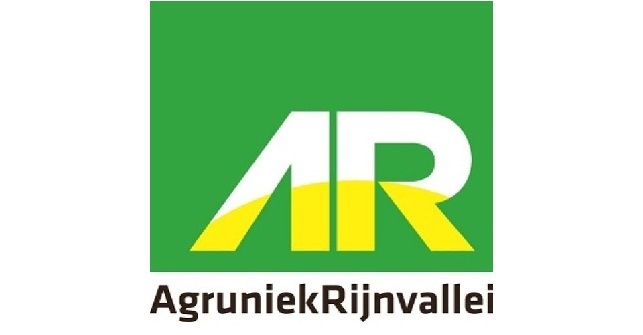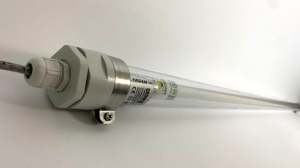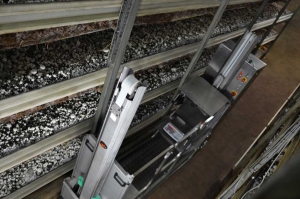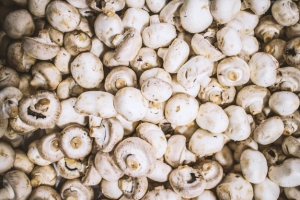GrowTime visits Sopińscy: Innovation in Practice
The GrowTime team recently visited Sopińscy Mushroom Cultivation in Wólka Kobyla, where an impressive 108 growing halls cover a total area of 76,236 m². This facility produces up to 430 tons of fresh mushrooms each week.
During the visit, the team discussed their ongoing collaboration, developments in the industry, and technological innovations such as GrowTime’s Newton and Pascal harvesting lorries, tools that have now become essential to Sopińscy’s daily production process.
Find out more about their visit and about GrowTime here.
The Growtime company has been steadily increasing exports and securing the confidence of major agricultural enterprises worldwide.
How GROWTIME and Osatina Grupa came together: a leap of faith that paid off
GROWTIME has again signed a contract with Osatina Grupa, a leading agricultural company in Croatia, for the supply of Newton mushroom picking lorries. Osatina Grupa, headquartered in the beautiful Đakovština area, is renowned for its comprehensive agricultural operations, including fruit and vegetable farming, dairy and meat production, animal feed production, and the generation of bioenergy. Their diversified and synergistic business model, which has been perfected over more than 25 years, emphasizes sustainability and modern technology.
The story of our collaboration with Osatina Grupa is one of risk, trust, and long-term success. As a large and innovative corporation, Osatina Grupa was a highly sought after business partner. They had numerous offers, many of which were less costly than what GROWTIME could provide. Negotiations during the COVID-19 pandemic added to the challenge, as physical presentations of our products were limited and travel was impossible due to the restrictions imposed.
Despite these hurdles, our high-quality and efficient products and the promise of lower overhead in the long run convinced Osatina Grupa to choose GROWTIME. They decided to take a risk on our more expensive Newton mushroom picking trolleys, driven by the argument that these high-quality devices would be more cost-effective over time.
A decision proven right
The initial cost of our trolleys appeared higher, but the investment was projected to pay off through superior performance and reliability. Osatina Grupa’s faith in our products was validated when they returned to GROWTIME for more of the same Newton picking trolleys a few years later, proving the wisdom of their original decision. This repeat business speaks volumes about the quality of our offering.
For GROWTIME, a client returning for the same product is the highest form of endorsement. It underscores that the initial investment, despite the higher initial price, was justified by the long-term benefits. The repeated orders from Osatina Grupa confirm the value and effectiveness of our solutions, showcasing our dedication to developing products that align perfectly with customer demands.
Cutting-edge Newton as well Pascal trolleys drive GROWTIME’s global success
A key driver behind this international success is GROWTIME's innovative products such as Newton & Pascal mushroom picking trolley. Known for their exceptional quality and cost-effectiveness, the Newton and Pascal trolleys has quickly become a favorite among large-scale mushroom producers. It was Osatina Grupa’s top choice then, and it’s their top choice now.
The trolleys feature from Growtime a robust design and user-friendly functionality, including electric drives and winches that automate the movement of the platform. This not only improves the ergonomics of the work but also increases the yield by allowing more precise and efficient picking. Additionally, the trolleys are equipped with advanced safety features and easy-to-use controls, ensuring both high performance and worker safety.
Moreover, Newton as well Pascal lorries ensure a quick return on investment due to their aforementioned low maintenance costs and high effectiveness. This combination of reliability and efficiency has made them a preferred option for agricultural enterprises looking to optimize operations and reduce overhead. For more information about the Newton mushroom picking trolleys and to explore GROWTIME's full range of products, visit this link.
How to choose lamps for a mushroom farm? A guide
We don't know of mushroom farms that aren't looking for ways to improve profitability or increase savings in the mushroom industry.
Mushroom lighting is a piece of equipment that affects the profitability of the business and is optimizable in many ways.
Based on our experience of working with mushroom farm owners around the world, we have prepared a guide that is likely to be of great value to both existing mushroom farms and those that are planned or under construction.
We invite you to read the guide here.
Are you planning, building or equipping a professional mushroom growing farm? At each of these stages, most investors are looking for answers to the question: whether to look for a general contractor who will take care of the whole investment or whether there is such a scope of this investment, where it’s worth finding an expert in a narrow area.
Why do we look for a general contractor?
The undoubted advantage of choosing a comprehensive contractor who will advise, build and equip the mushroom growing farm with all the necessary elements for the production of mushrooms is saving time and some ease in communication. You don’t need to test a dozen or so subcontractors, but establish good cooperation with only one. The trust that will appear along with the subsequent stages of a properly executed investment will give you peace of mind and space to plan the next steps, such as employment, logistics, sales and marketing. Fewer worries and more time. However, the most important benefit resulting from the choice of a single contractor is usually considered to be the savings obtained by buying everything in one place. After all, it has been known for a long time that by buying a package of services or materials “potentially” we should get lower rates and prices.
On the other hand, probably each of us has heard the saying that if someone declares that he is good at everything, then most often in practice it turns out that some areas of the offer are implemented averagely or even very poorly. Numerous owners of mushroom growing farms will confirm that they encountered or heard about such problems during the implementation of the investment.
In what cases is it worth looking for better solutions?
The key to achieving the high profitability of a thriving mushroom growing farm is to understand what affects the long-term viability of the business and that the devil is in the details. Despite the enormous automation, the largest costs of maintaining leading mushroom growing farms in 2022 are still the employment costs, and even achieving a significant saving on materials for the construction of the facility can only be apparent and will not compensate for the losses sustained in the long term due to the lack of selection of the optimal solutions, which can translate into lower employment costs, higher harvesting efficiency and, consequently, high profitability of the entire mushroom growing farm.
So what is worth paying attention to?
In the beginning, it is worth deepening the knowledge about the equipment for mushroom growing farms that is available on the market. Understanding the principle of operation, the purposefulness of the materials and technologies used will allow us to assess whether and which products available on the market will give us an advantage and facilitate long-term profitability. At the investment planning stage, it’s worth already delving into such products and areas as:
● shelving for mushrooms
● growing nets
● mushroom picking trolleys
● watering systems
● growing tunnel covers (in case of tunnel-like structure)
● lighting
● climate control
Each of the above elements is offered on the market in the form of products based on different quality and methods of execution (materials, technologies, construction, functions, etc.).
Let's use growing nets as the first example. The use of lower-quality materials can most often be noticed after the net becomes narrower after a few months of use and, as a consequence, the compost falls off its edges during transport. In such a case, a frequent and inevitable scenario is a net breakage, which leads to the need to stop loading, collect the substrate and replace the net. In our experience, the weakest nets break down after just a few months, and solid, good-quality products can last 10 or even 15 years.
 Another example is the mushroom picking trolleys, the design and functionality of which significantly affect the long-term efficiency of harvesting. Machines based on poor quality materials are less durable and require frequent servicing, and when the mushroom picking trolley is not working, the employee's productivity drops dramatically. One of the most important factors affecting the efficiency of the trolley is the time of continuous operation (of the drive of the trolley) between the battery charging processes. Trolleys that run continuously for up to 30 hours or more are a much more cost-effective solution than devices that run for a maximum of 8, 10 or 15 hours. It’s also worth paying attention to the possibility of picking mushrooms from the bottom shelf. This is what most producers declare, but in practice, only some of the devices on the market allow for such picking in an easy way (they have an adequate amount of free access space for the 1st shelf and thus a very low platform placement, which makes the picking easy).
Another example is the mushroom picking trolleys, the design and functionality of which significantly affect the long-term efficiency of harvesting. Machines based on poor quality materials are less durable and require frequent servicing, and when the mushroom picking trolley is not working, the employee's productivity drops dramatically. One of the most important factors affecting the efficiency of the trolley is the time of continuous operation (of the drive of the trolley) between the battery charging processes. Trolleys that run continuously for up to 30 hours or more are a much more cost-effective solution than devices that run for a maximum of 8, 10 or 15 hours. It’s also worth paying attention to the possibility of picking mushrooms from the bottom shelf. This is what most producers declare, but in practice, only some of the devices on the market allow for such picking in an easy way (they have an adequate amount of free access space for the 1st shelf and thus a very low platform placement, which makes the picking easy).

Summary
From our experience, a comprehensive (general) contractor in the mushroom growing industry often focuses on what the customer cares about - the lowest price. Very often, he provides a complete set of solutions, from the construction to the equipment of the mushroom growing farm, and the client accepts them based on trust and apparent savings. However, the cheap construction and equipment of the mushroom growing farm don’t mean long-term profitability for the business.
The profitability of a mushroom growing farm strictly depends on the solutions used in it and if a comprehensive contractor doesn’t offer solutions that are the most profitable (it’s difficult to specialize in every area), the only optimal way is to establish cooperation with a supplier who offers such solutions.
About the author:
GROWTIME is an international manufacturer of mushroom growing farm equipment.
GROWTIME specializes in the production of mushroom picking trolleys, with the focus on increasing the harvesting efficiency thanks to the solutions used in them. See the company's offer at growtime.eu.
The hands that grew a brew are now raising fungus for survival in northern West Bengal. Sabitri Toppo and Mausumi Minj are among 700 plantation workers who lost their jobs when the Madhu Tea Estate in West Bengal’s Alipurduar district.
The tea estate is one of 26 in the district’s Kalchini block, many of them in a bad shape due to low yield, quality and labour issues.
“We formed a cluster of women from 50 families, some of them from the closed tea estate, and trained them in organic mushroom farming more than a fortnight ago. We also provided them a permanent mushroom-growing shed and home-delivered spawn,” Binoy Dhar, a farm specialist with the Assam-based Mushroom Development Foundation (MDF) told The Hindu from the Kalchini area.
Please read the full article here.

























